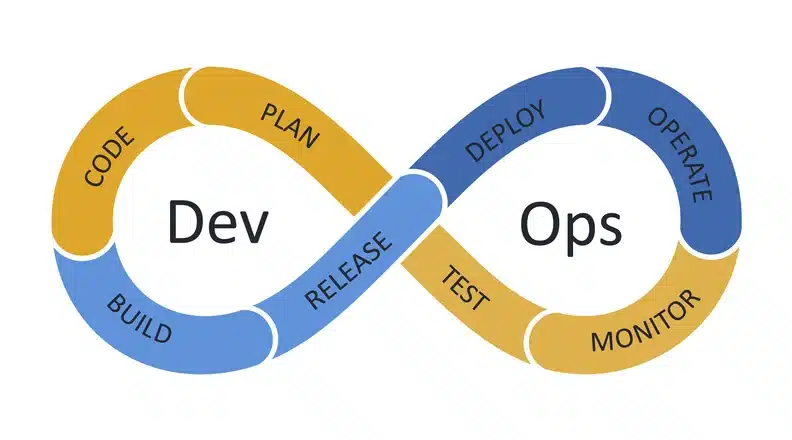The Ultimate Guide to DevOps: Lifecycle, Benefits & Future
Did you know that From 2023 to 2032, the DevOps industry is predicted to expand at a CAGR of more than 20%, reaching a value of more than $70 billion?
DevOps, though not a new concept and having existed for decades, now it has recently gained significant popularity among organizations. The impact of DevOps is profound, enabling organizations to enhance their agility, speed, quality, and cost-effectiveness.
DevOps, a term derived from “development” and “operations,” represents a collaborative approach that combines software development and IT operations to streamline the entire software delivery process.
In this article, we will explore the fundamental principles of DevOps, uncover its benefits, and understand why it is reshaping the software industry by answering those critical questions:
What exactly is Devops?
What are the main advantages of Devops? & Why is it important for any industry?
What are the key stages of the DevOps lifecycle?
What are the main challenges and opportunities for DevOps?
How can we imagine DevOps future?
1- What exactly is Devops?
DevOps is the combination of development and operations. It is a very recent term that has only been in use for about ten years..DevOps is an evolving framework that promotes faster and improved application development, as well as the rapid release of new or updated software features or products to customers.
It emphasizes the need for smooth and continuous communication, collaboration, integration, visibility, and transparency between development teams (Dev) and IT operations teams (Ops).
DevOps goals are often categorized into four areas: culture, automation, measurement, and sharing (CAMS).
DevOps tools play a crucial role in supporting these goals by streamlining and enhancing collaboration between development and operations workflows. These tools automate previously manual and time-consuming tasks involved in integration, development, testing, deployment, and monitoring.
A proficient DevOps practitioner should possess strong knowledge of the application development life cycle (ALC), infrastructure as code (IAC), configuration management, and continuous integration/delivery (CI/CD).
2- What are the main advantages of Devops & Why is it important for any industry?
Retail Industry, manufacturing, healthcare, banking and finance. All these industries and more have taken the advantage of DevOps.
DevOps has become increasingly important across various industries due to its numerous benefits.
Here are some key reasons why DevOps is important for any industry:
A. Faster Time to Market:
DevOps helps streamline the software development and deployment processes, enabling organizations to release software updates and new features more quickly.
B. Improved Collaboration:
DevOps promotes collaboration and communication between development teams, operations teams, and other stakeholders involved in the software delivery process.
This collaborative approach is beneficial in industries like finance, healthcare, and e-commerce, where complex systems require close coordination between different teams and departments.
C. Enhanced Stability and Reliability:
DevOps emphasizes the automation of processes, including testing, infrastructure provisioning, and deployment, to ensure consistency and reliability.
By using infrastructure-as-code and continuous integration/continuous deployment (CI/CD) pipelines, organizations can reduce errors and minimize system downtime.
For example, the financial industry, which relies heavily on robust and stable systems, has embraced DevOps to improve reliability and prevent financial losses due to system failures.
D. Scalability and Flexibility:
DevOps practices enable organizations to scale their infrastructure and applications efficiently.
Industries such as e-commerce, gaming, and online media, which experience significant fluctuations in user traffic, benefit from DevOps by ensuring their systems can scale up or down as needed without disruption.
E. Continuous Feedback and Improvement:
By collecting and analyzing data on system performance, user behavior, and other relevant metrics, organizations can make informed decisions to optimize their software and infrastructure.
Industries like telecommunications, where network performance and customer experience are crucial, leverage DevOps principles to continuously monitor and enhance their services.
Overall, DevOps brings numerous advantages to industries across the board. It drives efficiency, collaboration, reliability, and innovation, enabling organizations to deliver high-quality software faster and more reliably.
3- What are the key stages of the DevOps lifecycle?
In today’s rapidly evolving digital landscape, organizations are in a constant race to deliver high-quality software with unprecedented speed. The DevOps lifecycle has played a crucial role for development and operations to turn into a harmonious collaboration.
Let’s take a glimpse into the pivotal stages of tDevOps Lifecycle:
1. Plan: Set the stage for success by establishing clear objectives, requirements, and timelines. Lay a strong foundation to guide the entire process.
2. Code: Bring out the infinite creativity of developers who can create brilliant solutions to complex problems. Use version control technologies to ensure code integrity and promote collaboration.
3. Build: Build a solid codebase, using automation to change code quickly and effectively, and identify potential problems early in the development process.
4. Test: Automate testing procedures to ensure the software’s quality, reliability, and freedom from bugs. Testing becomes an integral part of the development process.
5. Deploy: Transition your software into production environments using automated deployment mechanisms. Minimize deployment risks and achieve faster time-to-market.
6. Operate: Maintain a watchful eye over your applications, closely monitoring their performance and swiftly identifying any anomalies.
The DevOps lifecycle empowers teams to swiftly deliver value to customers, staying ahead of the competition in this fast-paced digital era.

Take the Lead today and secure a free consultation with Wind_IS to apply DevOps for your business!
4- What are the main challenges and opportunities for DevOps?
The future of DevOps presents both challenges and opportunities for organizations. Here are the main challenges and opportunities that lie ahead:
The future of DevOps presents both challenges and opportunities for organizations. Here are the main challenges and opportunities that lie ahead:
A) Challenges:
– Balancing Speed and Quality:
As organizations strive to release software at an accelerated pace, maintaining a balance between speed and quality becomes challenging.
Ensuring that rapid delivery does not compromise the reliability, security, and overall quality of the software will be a key challenge.
– Automation:
Automation plays a crucial role in DevOps, but as technologies evolve, the challenge lies in keeping up with the rapid pace of automation advancements.
– Monitoring and Observability:
With the increasing complexity of systems and the rise of cloud-native architectures, DevOps teams need to invest in robust monitoring solutions and practices to proactively identify issues, troubleshoot problems, and ensure optimal system performance.
– Security:
DevOps teams must prioritize security at every stage of the development and deployment process, implementing robust security measures and practices to protect against vulnerabilities and cyber threats.
B) Opportunities:
– Enhanced Collaboration and Communication:
DevOps fosters collaboration and communication between development, operations, and other stakeholders. This presents an opportunity for organizations to improve cross-functional teamwork.
– Continuous Improvement:
Organizations can leverage this opportunity to establish feedback loops, gather insights from monitoring and analytics, and continuously enhance their processes, products, and services.
– Scalability and Flexibility:
DevOps practices provide opportunities to handle increased workloads, adapt to changing business needs, and support growth without compromising performance or stability.
– Innovation and Experimentation:
By promoting collaboration and rapid feedback, organizations can foster a climate that encourages teams to explore new ideas, test hypotheses, and drive innovation in their software development.
– Alignment with Business Objectives:
The future of DevOps lies in aligning technical initiatives with the overall business objectives of organizations.
By establishing a shared understanding and close collaboration between DevOps teams and stakeholders, organizations can ensure that their software delivery efforts directly contribute to business success.
In summary, the future of DevOps presents challenges in maintaining speed and quality, automation, monitoring, and security. However, it also offers opportunities for enhanced collaboration, continuous improvement, scalability, innovation, and alignment with business objectives.
5- How can we imagine DevOps future?
The future of DevOps holds immense potential and promises exciting possibilities.
The future of DevOps will be shaped by each organization’s unique needs and circumstances.
It remains bright and promising as it adapts to new trends and technologies that emerge. The key to success lies in leveraging available tools and embracing new technologies, with a continued focus on automation.
Conclusion:
DevOps, a combination of development and operations, has gained popularity among organizations due to its ability to enhance agility, speed, quality, and cost-effectiveness.
DevOps tools streamline collaboration between development and operations workflows, enabling faster software release. It promotes collaboration and communication between development and operations teams, and emphasizes automation of processes to ensure consistency and reliability.
The future of DevOps presents challenges in maintaining speed and quality, automation, monitoring, and security, but it remains promising as it adapts to new trends and technologies.
The key to DevOps success lies in leveraging available tools and embracing new technologies, with a focus on automation.



